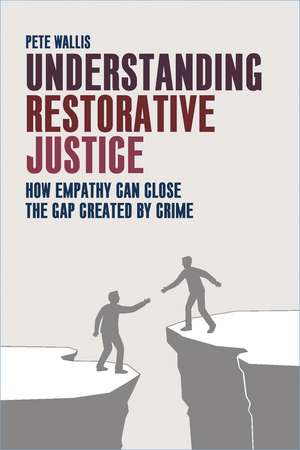Understanding Restorative Justice: How Empathy Can Close the Gap Created by Crime
Autor Pete Wallisen Limba Engleză Paperback – 10 iul 2014
This book offers a clear and detailed introduction to the ways that restorative justice can be used to nurture empathy, exploring such key themes as responsibility, shame, forgiveness, and closure. It uses numerous case studies to explore the timeline of restorative justice, from an initial offense, through the criminal justice process, then into the heart of the restorative meeting and beyond. It will serve as the perfect introduction for those new to restorative justice, as well as a best practices guide for acting practitioners.
Preț: 139.18 lei
Nou
Puncte Express: 209
Preț estimativ în valută:
26.63€ • 27.81$ • 21.99£
26.63€ • 27.81$ • 21.99£
Carte disponibilă
Livrare economică 25 martie-08 aprilie
Livrare express 08-14 martie pentru 23.06 lei
Preluare comenzi: 021 569.72.76
Specificații
ISBN-13: 9781447317425
ISBN-10: 1447317424
Pagini: 224
Ilustrații: illustrations
Dimensiuni: 152 x 229 x 13 mm
Greutate: 0.34 kg
Ediția:New.
Editura: Bristol University Press
Colecția Policy Press
ISBN-10: 1447317424
Pagini: 224
Ilustrații: illustrations
Dimensiuni: 152 x 229 x 13 mm
Greutate: 0.34 kg
Ediția:New.
Editura: Bristol University Press
Colecția Policy Press
Notă biografică
Pete Wallis is senior practitioner in restorative justice for Oxfordshire Youth Offending Service.
Cuprins
Introduction
Part One
Empathy Level Zero: Hurting
Crime and unhappiness
The gap caused by crime
Part Two
Empathy Level One: Seeing
Entering the criminal justice system
Into the criminal courts
Part Three
Empathy Level Two: Voicing
Unripe restorative justice
Restorative enquiry
The keys and blocks to restorative justice
Choice, encouragement or coercion?
Part Four:
Empathy Level Three: Hearing
Indirect restorative justice
The restorative meeting
Part Five:
Empathy Level Four: Helping
'Doing sorry'
Does it always go so well?
Part Six:
Empathy Level Five: Healing
Into the heart of restorative justice
Conclusion
Part One
Empathy Level Zero: Hurting
Crime and unhappiness
The gap caused by crime
Part Two
Empathy Level One: Seeing
Entering the criminal justice system
Into the criminal courts
Part Three
Empathy Level Two: Voicing
Unripe restorative justice
Restorative enquiry
The keys and blocks to restorative justice
Choice, encouragement or coercion?
Part Four:
Empathy Level Three: Hearing
Indirect restorative justice
The restorative meeting
Part Five:
Empathy Level Four: Helping
'Doing sorry'
Does it always go so well?
Part Six:
Empathy Level Five: Healing
Into the heart of restorative justice
Conclusion
Recenzii
“A compelling, honest, and moving book which will make a huge contribution to the field.”
"A well-researched, original, and welcome contribution to the growing literature on restorative justice, focusing on the development of empathy to gradually reveal the layers of the restorative process."
